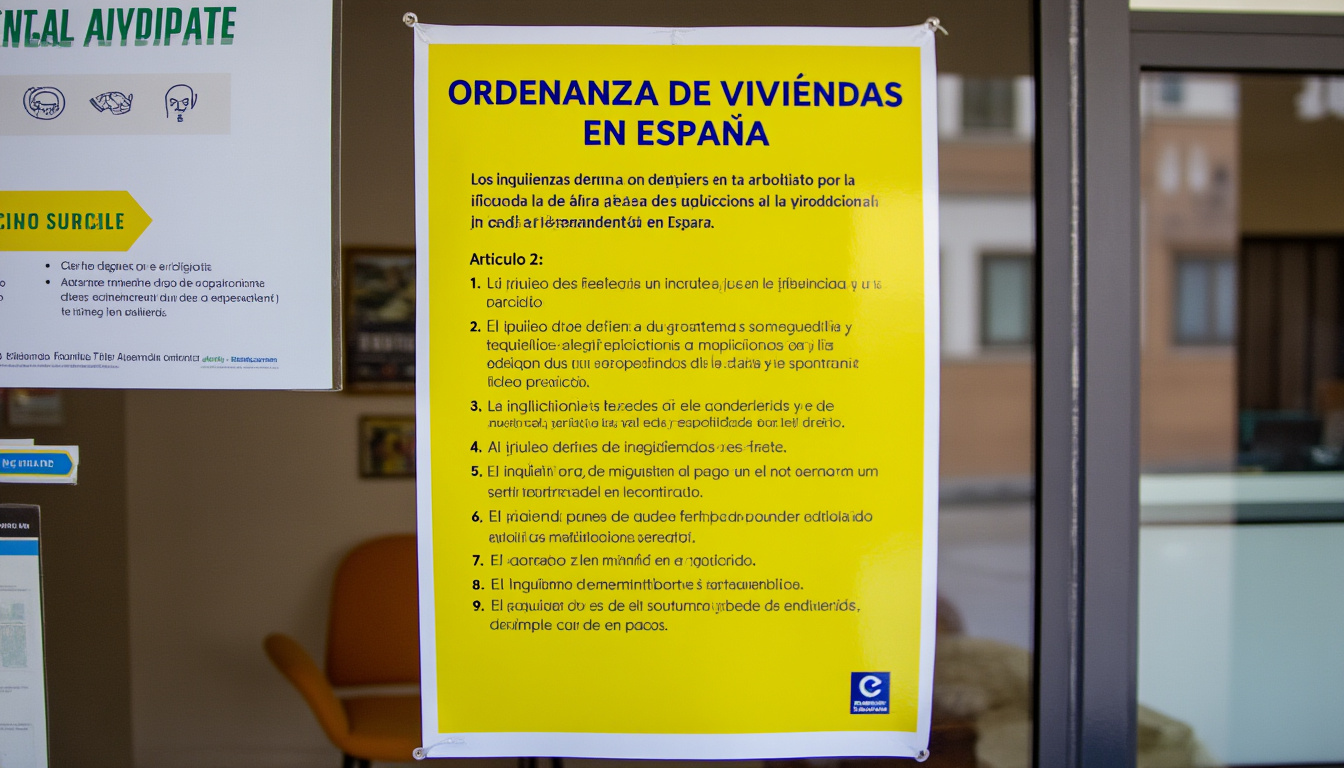In recent years, the surge of short-term rental platforms has transformed the travel landscape, leading to vibrant discussions surrounding urban housing markets. Spain’s latest governmental decision to mandate Airbnb to remove approximately 66,000 property listings marks a pivotal moment in this ongoing debate. With the housing crisis intensifying, particularly in urban areas such as Barcelona and Madrid, this action reflects a growing urgency to ensure equitable access to housing while grappling with the nuances of tourism economics.
Impact of Government Regulations on the Short-Term Rental Market in Spain
The recent government directive in Spain serves as a profound indicator of the changing dynamics within the short-term rental market. Growing discomfort regarding the impact of platforms like Airbnb, Booking.com, and VRBO has necessitated a series of interventions aimed at regulating listings more stringently. Spain’s crackdown isn’t an isolated event; it resonates with global trends as cities worldwide adopt similar regulatory frameworks to curb the negative consequences of unchecked tourism.

The Historical Context of Short-Term Rentals in Spain
To appreciate the current situation, it is essential to understand the trajectory of short-term rentals in Spain. The rise of platforms like Airbnb and HomeAway began over a decade ago, enabling homeowners to lease their spaces to travelers. Initially hailed as a boon to the tourism sector, the situation has evolved into a contentious debate over housing availability and affordability.
In particular, major cities such as Barcelona have witnessed a dramatic rise in the number of rental units converted to short-term accommodations. As a result, neighborhoods traditionally viewed as residential have transformed, exacerbating tensions between locals and tourists. The pushback from residents has escalated protests and calls for tighter regulations, as communities aim to preserve their character and ensure housing remains accessible to residents.
Key Factors Behind the Current Crackdown
The driving force behind Spain’s recent actions can be attributed to several critical factors:
- Housing Shortage: Spain faces one of the most severe housing crises in Europe. High rental prices in urban centers have made it increasingly challenging for locals to find affordable housing.
- Illegal Listings: Many of the 66,000 listings ordered for removal were found to lack proper licensing or were operating under fraudulent license numbers, failing to comply with local laws.
- Corporate Ownership Transparency: Regulation demands more transparency regarding whether properties are managed by individuals or corporations, aiming to prevent unintended monopolistic practices in certain areas.
Spain’s Minister of Consumer Affairs, Pablo Bustinduy, has underscored the government’s commitment to balancing tourism interests with residents’ rights. This action represents a concerted effort to ensure that economic interests do not supersede the fundamental right to housing, asserting a more equitable urban environment.
| Impact Area | Details |
|---|---|
| Housing Affordability | Significant strain on local residents’ ability to secure affordable housing due to influx of short-term rentals. |
| Local Economy | Challenges for local businesses striving to cater to both tourists and residents. |
| Community Relations | Tension between tourists and local residents can lead to a decline in neighborhood cohesion. |
The Legal Landscape and Compliance Issues for Airbnb in Spain
Airbnb’s dilemma is further complicated by the intricate legal landscape surrounding its operations in Spain. In response to various government interventions, it has become crucial for property owners and hosts to understand and comply with ever-evolving regulations. The recent mandate to remove thousands of listings emphasizes the potential legal repercussions of non-compliance.
Understanding Local Laws and Licensing Requirements
Among the important steps in adhering to local legislation is obtaining necessary permits and licenses. Each region in Spain has its own regulations governing short-term rentals—what may be permissible in one city could be entirely illegal in another. Property owners must educate themselves about these regional differences and remain vigilant in ensuring compliance. Typically, the following processes may be involved:
- Application for License: Hosts must formally apply for a rental license, outlining details about the property and intended use.
- Established Regulations: Many regions stipulate limits on the number of short-term rentals permissible within certain areas to prevent oversaturation.
- Tax Obligations: Compliance with local tax laws is essential, which often involves collecting and remitting specific taxes applicable to short-term rentals.
Failure to adhere to these regulations can result in hefty fines, legal actions, and ultimately the loss of the ability to operate as a host on platforms like Airbnb, Expedia, or FlipKey. This crucial awareness offers hosts the tools necessary to navigate the complex landscape while safeguarding both their business interests and community well-being.
Case Study: Barcelona’s Regulation Initiatives
Barcelona serves as an exemplary case of enforcing strict regulations on short-term rentals. In 2019, the city implemented a moratorium on new licenses, asserting that existing ones must be rigorously checked for compliance. This proactive approach has yielded insights applicable to other cities facing similar challenges.
By analyzing the outcomes of Barcelona’s initiatives, other municipalities can glean valuable lessons regarding:
- Effective Monitoring: Utilizing technology to track rental compliance can help enforce local laws more efficiently.
- Community Involvement: Engaging local residents in discussions regarding rental regulations fosters trust and generates collaborative solutions.
- Promoting Alternative Housing Solutions: Investing in long-term housing solutions can counteract the potential negative effects of short-term rentals.
As Spain’s housing crisis continues to evolve, cities are monitoring the effectiveness of their regulatory frameworks, keeping the communities they serve at the forefront of their initiatives.
Implications for Property Owners and Investors in Spain’s Rental Market
The mandated removal of numerous listings from Airbnb will undoubtedly impact property owners and investors. In an industry characterized by its volatility, immediate changes must be strategically navigated to ensure continued viability. With a robust understanding of market trends and regulations, property owners can adapt their business models to remain competitive while complying with local laws.

Adapting to New Market Realities
Facing increased scrutiny and regulation, property owners must recalibrate their approaches to remain relevant in a transforming market. Strategies emerging from this shift include:
- Long-Term Rental Options: Converting properties to long-term rentals may stabilize income and align with regulatory requirements.
- Targeting Domestic Renters: Adjusting marketing strategies to attract local tenants instead of relying solely on short-term tourist demand.
- Diversifying Platforms: Exploring alternatives like TripAdvisor Rentals or Tujia can diversify avenues for attracting potential guests.
By embracing these strategies, property owners can mitigate risks and capitalize on new developments. In particular, long-term rentals may provide a more stable income stream while contributing positively to the local housing market’s recovery.
Investor Perspectives amidst Regulatory Changes
Investors must reassess their approaches in light of the recent changes. The reduction in short-term options can pressure pricing dynamics, leading to potential shifts in investment strategies such as:
- Investing in Compliance: Ensuring properties meet regulatory requirements can enhance long-term sustainability.
- Market Research: Understanding shifting demands brought about by regulatory frameworks can guide investment decisions.
- Geographic Diversification: Expanding investment portfolios across different markets may provide insulation against localized risks.
Investors who develop a nuanced understanding of the changing regulatory landscape will be better positioned to navigate a challenging terrain in Spain’s rental market.
| Strategy | Benefit |
|---|---|
| Long-Term Rentals | Stable income, aligns with regulations. |
| Diverse Platforms | Wider audience reach, lowers dependency on a single platform. |
| Geographic Diversification | Reduces localized risks, better market resilience. |
Future Trends in the European Short-Term Rental Market Post-Removal
Looking ahead, the impact of Spain’s mandate on the overall European short-term rental market warrants careful examination. As more countries begin to explore the potential for stricter regulations, other stakeholders, including real estate developers and investors, must be prepared for the evolving landscape.
Rising Demand for Ethical Tourism
The dawn of a new era in tourism prioritizes ethical considerations and respect for local communities and spaces. As travelers increasingly seek authentic experiences, they are looking to book accommodations that contribute positively to the destinations they visit. This trend highlights a demand for:
- Responsible Hosting: Property owners who engage with their communities and prioritize ethical practices will differentiate themselves.
- Eco-Friendly Accommodations: Sustainable practices in property management contribute to an enhanced experience for socially-conscious travelers.
- Transparency: Open communication of community impacts enhances brand trust among potential guests.
The increasing inclination toward ethical tourism represents an opportunity for hosts to align their practices with evolving traveler sentiments, potentially resulting in improved reputation and revenue.
The Role of Technology in Shaping the Future of Rentals
Technology continues to transform the rental landscape, impacting how property owners manage their listings and engage with guests. For instance, advancements in smart home technology, data analytics, and marketing automation allow hosts to maintain competitive advantages. Future developments may include:
- Streamlined Booking Processes: Enhanced booking experiences through technology can attract bookings across various platforms.
- Data-Driven Insights: Leveraging data analytics can guide owners in making informed pricing and marketing decisions.
- Virtual Tours: Offering virtual experiences can enhance listings and appeal to renters looking for comprehensive previews.
Property owners who embrace technological innovation may find unique avenues to revitalize their offerings while responding to changing market demands. Innovative tools designed specifically for managing listings can be accessed through platforms focused on simplifying operations and improving guest interactions.
| Trend | Potential Impact |
|---|---|
| Ethical Tourism | Increased traveler preference towards responsible accommodations. |
| Technology Adoption | Improved operational efficiency and guest engagement. |
| Market Adaptation | Ability to pivot strategies swiftly in response to regulatory frameworks. |
